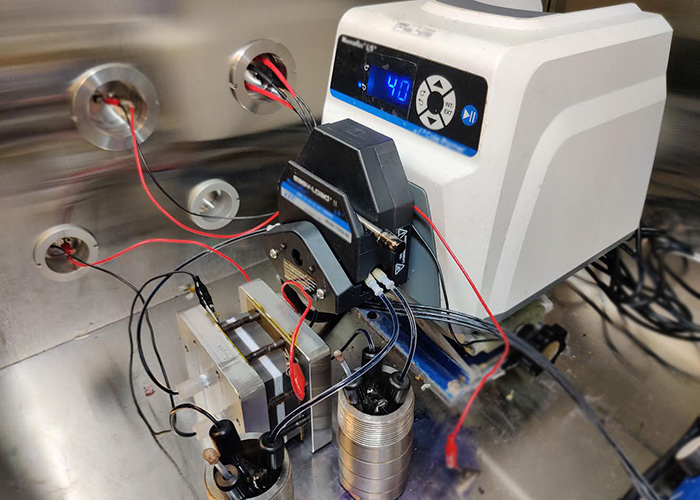From pv magazine International
Researchers at the University of Akron in the United States have developed a water-soluble positive electrolyte – a, so-called catholyte – that is claimed to increase the energy density of aqueous organic redox flow batteries (AORFBs).
The scientists shaped the catholyte by using two ligands: 2,2′-bipyridine-4,4′-dicarboxylic (Dcbpy) acid, and cyanide. Cyanide was previously used in other research and was found to be able to improve the voltage and solubility of redox batteries compared to the commonly used ferrocyanide ligands.
The academics built the battery through what they called a symmetry-breaking strategy, which consists of changing the symmetry of the redox-active organic molecules, instead of using the common approach of attaching a hydrophilic functional group. Hydrophilic functional groups are membranes used to achieve fast ion transport combined with high molecular selectivity, and to provide aqueous organic flow batteries with energy efficiency and capacity retention.
The research group said its approach results in a considerable improvement of the molecules’ solubility. The battery is claimed to have retained more than 90% of capacity over 6,000 cycles, which the scientists said projects “more than 16 years of uninterrupted service [at] a pace of one cycle per day.” The capacity fading rate was 0.00158% per cycle, or 0.217% per day.
The scientists are currently planning to design new materials for this battery technology and have already submitted a patent application to the relevant U.S. authorities. “To significantly improve the performance of aqueous organic RFBs, the urgency of developing new catholyte[s] is crucial,” said researcher Yu Zhu.
The device was described in the paper Symmetry-breaking design of an organic iron complex catholyte for a long cyclability aqueous organic redox flow battery, published in nature energy.
This content is protected by copyright and may not be reused. If you want to cooperate with us and would like to reuse some of our content, please contact: editors@pv-magazine.com.









By submitting this form you agree to pv magazine using your data for the purposes of publishing your comment.
Your personal data will only be disclosed or otherwise transmitted to third parties for the purposes of spam filtering or if this is necessary for technical maintenance of the website. Any other transfer to third parties will not take place unless this is justified on the basis of applicable data protection regulations or if pv magazine is legally obliged to do so.
You may revoke this consent at any time with effect for the future, in which case your personal data will be deleted immediately. Otherwise, your data will be deleted if pv magazine has processed your request or the purpose of data storage is fulfilled.
Further information on data privacy can be found in our Data Protection Policy.